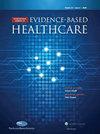专注是循证实践的新智商。
Q3 Medicine
International Journal of Evidence-Based Healthcare
Pub Date : 2019-11-09
DOI:10.1097/XEB.0000000000000211
引用次数: 2
摘要
在循证医疗(EBHC)领域工作的大多数个人和组织的重点是操作证据。很少有人会认为EBHC的主要驱动因素和最终目标是看到它被用于为政策和实践提供信息,从而改善患者的预后。然而,我们很难不把无限大的水池看作是对方法论反思、改进和重新概念化的潜在无限努力的隐喻,这是我们许多以证据为基础的研究人员寻求实现的目标。潜入“方法论的无限池”(或者进入兔子洞——你可以选择最适合你的象征或意象)可以带来新鲜的、意想不到的突出。毫无疑问,从切线的角度来考虑我们想要解决的一些问题会带来一些好处。然而,这些切线并不一定总是富有成效或实用的,需要相应地加以调整。在这种情况下,系统评论的价值主张是它们提供严格审查和合成可信证据的能力。因此,至关重要的是,我们要兑现这一承诺,并投资于确保为关键利益相关者提供最高质量的结果。为此目的,科学方面的方法学进步以及及时提供和更新综合证据继续快速进行。对于不同类型的证据,现在出现了相当多的新的方法方法,并且在进行系统评价时,也有越来越多的工具可用于帮助改善报告和方法质量(QUOROM, PRISMA, AMSTAR, COSMIN, MOOSE, OQAQ, ROBIS)。然而,尽管存在这些工具,常见的错误仍然存在,包括使用不完整的指导,不正确地使用报告工具和检查清单,或在不参考进行审查的方法指导的情况下孤立地使用收费。对目前支撑系统评价,特别是荟萃分析的科学也提出了重大批评。杰出的、经验丰富的合成科学学者,如John Ionnidis和Jos Kleijnen(以及其他人),经常被引用,因为他们对相关问题的观察本文章由计算机程序翻译,如有差异,请以英文原文为准。
Focus is the new intelligence quotient for evidence-based practice.
The focus of most individuals and organizations working in the field of evidence-based healthcare (EBHC) is to operationalize evidence. Few would argue that the primary driver and ultimate objective of EBHC is to see it utilized to inform policy and practice that results in improved outcomes for patients. However, it is hard not to think of the infinity pool as a metaphor for the potentially limitless endeavour of methodological reflection, refinement and reconceptualization that many of us as evidence-based researchers seek to achieve. Diving into ‘methodological infinity pools’ (or down rabbit holes – you can choose whichever symbolism or imagery works best for you) can result in fresh, unexpected salience. There is no doubt that some benefit can come from considering tangential ways of thinking about some of the problems we seek to solve. Nevertheless, these tangents are not always necessarily productive or pragmatic and need to be tempered accordingly. The value proposition of systematic reviews in this context has been their ability to provide rigorously reviewed and synthesized trustworthy evidence. It is therefore critical that we deliver on that promise and invest in ensuring the highest quality result for key stakeholders. To that end, methodological advances in the science and timely delivery and update of evidence syntheses continue at a rapid rate. A considerable number of new methodological approaches are now appearing for different types of evidence, and there are also an increasing number of tools available to assist in improving reporting and methodological quality in the conduct of systematic reviews (QUOROM, PRISMA, AMSTAR, COSMIN, MOOSE, OQAQ, ROBIS). However, despite the existence of such tools common errors persist, including use of incomplete guidance, incorrect use of reporting tools and checklists or use of tolls in isolation without reference to methodological guidance for the conduct of reviews. Significant criticism has also been levelled at the science that currently underpins the conduct of systematic reviews and, in particular, meta-analyses. Prominent, experienced synthesis science scholars like John Ionnidis and Jos Kleijnen (among others) have been frequently cited for their observations regarding issues related to
求助全文
通过发布文献求助,成功后即可免费获取论文全文。
去求助
来源期刊

International Journal of Evidence-Based Healthcare
Medicine-Health Policy
CiteScore
1.80
自引率
0.00%
发文量
39
期刊介绍:
The International Journal of Evidence-Based Healthcare is the official journal of the Joanna Briggs Institute. It is a fully refereed journal that publishes manuscripts relating to evidence-based medicine and evidence-based practice. It publishes papers containing reliable evidence to assist health professionals in their evaluation and decision-making, and to inform health professionals, students and researchers of outcomes, debates and developments in evidence-based medicine and healthcare.
The journal provides a unique home for publication of systematic reviews (quantitative, qualitative, mixed methods, economic, scoping and prevalence) and implementation projects including the synthesis, transfer and utilisation of evidence in clinical practice. Original scholarly work relating to the synthesis (translation science), transfer (distribution) and utilization (implementation science and evaluation) of evidence to inform multidisciplinary healthcare practice is considered for publication. The journal also publishes original scholarly commentary pieces relating to the generation and synthesis of evidence for practice and quality improvement, the use and evaluation of evidence in practice, and the process of conducting systematic reviews (methodology) which covers quantitative, qualitative, mixed methods, economic, scoping and prevalence methods. In addition, the journal’s content includes implementation projects including the transfer and utilisation of evidence in clinical practice as well as providing a forum for the debate of issues surrounding evidence-based healthcare.
 求助内容:
求助内容: 应助结果提醒方式:
应助结果提醒方式:


